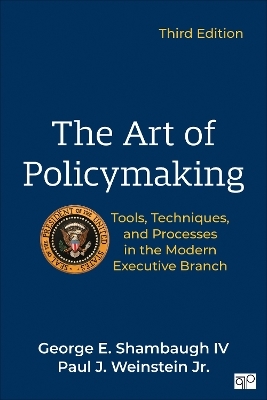
The Art of Policymaking
Cq Press (Verlag)
978-1-0719-1787-9 (ISBN)
- Noch nicht erschienen (ca. September 2024)
- Versandkostenfrei innerhalb Deutschlands
- Auch auf Rechnung
- Verfügbarkeit in der Filiale vor Ort prüfen
- Artikel merken
The Art of Policymaking is the only book designed to provide students and practitioners with a detailed explanation of the specific tools, techniques, and processes used to create policy in the U.S., as well as the tools they need to understand them. The book includes practical advice on how to write memos, prepare polling questions, and navigate the clearance process. Case studies show how actual policies were developed and how and why policies and processes differed across administrations. And scenarios allow students to practice the tools and techniques they have learned by working through both domestic and foreign policy situations. Written by two experts in the field with experience in both academia and government, The Art of Policymaking is the perfect how-to guide for students and professionals.
Dr. George E. Shambaugh, IV is Professor of International Affairs and Government at the Edmund A. Walsh School of Foreign Service, Director of the Masters of Science in Foreign Service Program, and former chairman of the Department of Government at Georgetown University. He holds a Ph.D. and M. Phil. in Political Science, and an M.A. in International Affairs from Columbia University, as well as a B.A. in Government and Physics from Oberlin College. His research focuses on international political economy, international politics, foreign policy, and the environment. Dr. Shambaugh is the author of Oracles, Heroes or Villains: Economic Policymakers, National Politicians, and the Power to Shape Markets (Cambridge 2019), States, Firms, and Power: Successful Sanctions in U.S. Foreign Policy (SUNY, 1999), co-author of the first and second editions of The Art of Policymaking: Tools, Techniques, and Processes in the Modern Executive Branch (Longman, 2003, Sage 2016), co-editor of Anarchy and the Environment: The International Politics of Common Pool Resources (SUNY, 1999), and co-editor of three issues of Taking Sides: Clashing Views on Controversial Issues in American Foreign Policy (McGraw-Hill, 2006, 2008, 2010). His articles have appeared in a range of journals, including the PLoS One, Sustainability, American Journal of Political Science, International Studies Quarterly, The Journal of Peace Research, Review of International Studies, Analyses of Social Issues and Public Policy, International Politics, Environmental Politics, International Interactions, and Security Dialogue. He has received grants and awards from the National Science Foundation, the Smith Richardson Foundation, the Social Science Research Council, the MacArthur Foundation, the International Studies Association, the American Political Science Association, and the Oberlin Alumni Foundation, and he has been a MacArthur Foundation and Dwight D. Eisenhower/Clifford Roberts Fellow. Paul J. Weinstein, Jr. is the Cofounder and Director of the Graduate Program in Public Management at Johns Hopkins University. He also directs the schools Masters program in Nonprofit Management. He holds an M.A. in International Affairs from Columbia University and a B.S. in Foreign Service from Georgetown University. A veteran of two presidential administrations, he was senior adviser to the National Commission on Fiscal Responsibility and Reform (Simpson-Bowles), which President Obama created to address the nation’s mid- and long-term fiscal challenges. Weinstein formerly served as special assistant to the president and chief of staff of the White House Domestic Policy Council and then later as Senior Advisor for Policy Planning to Vice President Gore during the Clinton Administration. Before that, Weinstein served as a senior legislative aide to then-Representative C. Thomas McMillen (D-MD) and then-Senator Albert Gore, Jr. (D-TN). Since 2001, Weinstein has served as a senior fellow at the Progressive Policy Institute, where he was chief operating officer for five years. He currently serves on the organization’s advisory board. He also consults for the IntraFi Network and is the primary author of its quarterly bank survey. He has advised numerous elected officials, including former governors Jennifer Granholm and Christine Gregoire, and has worked for or advised five presidential candidates. Weinstein has taught at Johns Hopkins University since 2003 and has also lectured at Columbia University and Georgetown University. He is co-author of the first and second editions of The Art of Policymaking: Tools, Techniques, and Processes in the Modern Executive Branch (Longman, 2003, Sage 2016). He has written chapters in a number of other books, and his writing has also appeared in USA Today, The Atlantic, The Boston Globe, The Baltimore Sun, CNN, New York Newsday, Forbes, Investor’s Business Daily, San Francisco Chronicle, New York Daily News, and Politico, among others.
Chapter 1: Why the Policymaking Process Matters
PART I. THE POLICYMAKERS
Chapter 2: The White House Policy Councils
Chapter 3: The White House Staff
Chapter 4: Agencies and Policy Implementation
Chapter 5: Policy Management
PART II. TOOLS OF THE TRADE
Chapter 6: Policymaking Memoranda
Chapter 7: Policy Implementation Tools
Chapter 8: The State of the Union and the Budget Process
Chapter 9: Legislative Clearance and Coordination: SAPs, LRMs, and Other Policy Acronyms
Chapter 10: Polling and the Policymaking Process
Chapter 11: Communicating and Marketing Policy
PART III. CASE STUDIES
Chapter 12: Social Policymaking: Welfare Reform During the Clinton Administration
Chapter 13: Economic Policymaking I: The Clinton Economic Plan
Chapter 14: Economic Policymaking II: The Simpson-Bowles Commission Under President Obama
Chapter 15: Security Policymaking I: Desert Shield and Desert Storm Under George H. W. Bush
Chapter 16: Security Policymaking II: The Surge and Iraq War Under George W. Bush
Chapter 17: Congress and the Executive Branch: Yemen Policy during the Trump and Biden Administrations
PART IV. SCENARIOS
Chapter 18: Practice Scenarios
Glossary
| Erscheint lt. Verlag | 14.9.2024 |
|---|---|
| Verlagsort | Washington |
| Sprache | englisch |
| Maße | 152 x 228 mm |
| Themenwelt | Sozialwissenschaften ► Politik / Verwaltung ► Staat / Verwaltung |
| ISBN-10 | 1-0719-1787-0 / 1071917870 |
| ISBN-13 | 978-1-0719-1787-9 / 9781071917879 |
| Zustand | Neuware |
| Haben Sie eine Frage zum Produkt? |
aus dem Bereich


